Speak to a Recovery Expert today

The Ultimate Recovery / Compression Boot Guide for 2023
Contents:
- What are compression boots?
- What are the leading brands and their features?
- Comparison between leading brands and models
- Advantages
- Disadvantages
- FAQ’s about compression boots
What are compression boots?:
Compression boots are inflatable leg sleeves which use intermittent air pressure to squeeze around your legs. This intermittent pressure squeezes different areas of your leg in turn, then the release of this pressure causes an increase in blood flow to flush through your legs and circulate through your body. Otherwise known as ‘pneumatic leg compression systems’, they are designed to sequentially compress the legs to flush out metabolic waste and bring fresh oxygenated blood back to the area. It is this removal of waste and arrival of oxygenated blood that helps you recover quicker, reducing muscle soreness causing the feeling of fresh legs.
The USP of compression boots is that they provide active recovery, without actually having to be active. That means you can reap the advantages of active recovery while working at your desk, watching TV at home or even just scrolling through your social media.
Beginners guide to understanding compression boots:
The leg sleeves are placed on and zipped up, with an attached unit. This unit then pumps air into the leg sleeve at your chosen pressure. This creates an intermittent squeezing sensation around your legs. The pressure moves between each chamber of the leg sleeve in a number of sequences (different brands of compression boot, has a different number of chambers, see below). The amount of time you spend in your recovery boots is completely up to you, we would recommend between 15-30 minutes. Furthermore, there are a number of different brands to choose from (see below), each having their own patented technology to ensure you have the best recovery experience.
There are a number of physiological benefits to the use of compression boots for sports recovery, these include increased blood circulation, accelerated lymphatic drainage and improved flexibility. Using compression boots following exercise allows your muscles to repair quicker, so you get to see the benefits of your workout sooner, whilst also leaving you feeling fresh legged and ready to go again at peak performance.
Compression boots are not just for athletes. The benefits to the use of compression therapy are great for everyday use and can be beneficial for a number of medical conditions. Everyday benefits include; improved blood circulation, enhanced range of motion and more time taken to sit in your boots and just relax!
What are the leading compression boot brands and their features?
Deciding which compression boots brands to use can really be a nightmare. Do you go with the most reputable brand? Or do you go with a brand which is cost effective?We have hand selected the brands and models which we believe are the best out there on the market at this moment in time.
- Hyperice - Normatec 3:
The OG (original) and trusted. Normatec has been the market leading compression brand for a number of years. Developed by a physician bioengineer, the system was designed to sit within a medical practice, to help improve blood flow and speed up the recovery process. However, over a number of years, their integration into elite and sub-elite sport has become ever present.
With the latest release, the Normatec 3, we believe that Hyperice have raised the game again. These boots use patented pulse technology, a brand new massage pattern which has been scientifically proven to enhance recovery. With the bluetooth app, the Normatec 3 allows you to control the device entirely from your phone; as well as being even more customizable for the user, by allowing you to control the compression levels in different segments of the boots. These are the real deal!
- Therabody - JetBoots:
Wireless compression boots? You heard it right! Therabody have recently introduced the Jet Boots - a fully portable pneumatic compression system with up to 4 hours of battery life. Using the new ‘fast flush technology’, Therabody claim that these boots allow you to recover between 2-3 times quicker than some of their rivals!
Using bluetooth connectivity, these boots allow you to also control your workout from your phone. On the move or at home, these boots offer great flexibility, particularly when life gets busy.
- MyoMaster - MyoAir:
The new boys on the block. Achieving pressures of up to 250 mmHg, these boots are incredibly powerful. They even claim that 91% of athletes reported significantly faster recovery times within just two weeks of using the MyoAir. So these must be effective?
- RecovaPro - Air Compression Boots:
The attachment alternative. The RecovaPro compression system is extremely versatile - with multiple attachments, which are interchangeable upon your injury. Reaching pressures of up to 150mmHg, this system is definitely able to hold their own against the bigger brands.
- Compex - Compex Ayre:
The cheaper alternative. These boots are designed to be extremely portable and easy to use on the go. Another wireless product, where the integrated compression controls remove the bulk of a separate, wired unit.
Comparison between leading compression boot brands
There are lots of different features surrounding compression boots which you, as the buyer, must consider before purchasing. With there being so many boots out there, understanding what makes some brands stand out is paramount when making these informed decisions. Also, understanding how to interpret the important values which draw you in can make your life a lot easier. For example; some brands advertise that their boots reach 250 mmHg, but is that really necessary? Do you need to have that much pressure in your boots?
To help differentiate these rapidly growing options, we put together a roundup of the best compression boots for all types of individuals.

Now looking at this information, some of you may be saying ‘but they’re all so similar, how do I differentiate which ones are best?’. Ultimately, picking the right compression boots can be a pain. But we at Recoverfit, are able to give you the most trusted advice on what best suits your individual needs.
Advantages of using compression boots:
1. Improve circulation:
As the compression boots increase in pressure, this squeezes your leg. This pressure helps push your blood up through your veins to your heart at an increased rate. Upon release of this pressure blood, full of oxygen, flushes the muscle to aid repair. It is like having an additional pump, to your heart, but in the area of compression
2. Enhance lymphatic drainage:
Our Lymphatic system is essentially our body's transport system to fight against any infections or damage to the body, playing an important role in the immune response. Lymph nodes release the cells, through lymph vessels, that help the body repair.
Your lymphatic system can become overworked, especially following exercise. With its important role in the immune response, you can imagine we need it in tip top condition. Unfortunately, exercise makes the system have to work overtime to remove toxins, such as lactic acid. When the muscles have worked hard there can be a build up of fluid released to help remove the toxins from the damaged muscle tissue. This is our body trying to help heal itself but, it can cause swelling, stunting recovery and causing the feeling of soreness. Therefore, lymphatic drainage is necessary to allow waste products to get out of your muscles and allow fresh products to flush your muscle tissue and to reduce soreness caused by swelling. This soreness is commonly known as DOMS (Delayed onset of muscle soreness), which for those who have experienced it, is not very pleasant!
Lymphatic drainage is achieved as the areas of the leg are compressed in turn, pushing the fluid up through the leg, back to the lymph nodes.
3. Remove waste products:
Waste products build up during exercise as a huge demand is put on the muscles to contract and produce the required movements. To make energy to do this, the body undergoes a process called respiration. It is this respiration that produces waste products such as CO2 and lactic acid. In order to start the recovery process, the body has to get rid of these waste products ASAP!
The compression boots increase blood circulation by intermittently squeezing areas of the leg. The pressure squeezes blood back to the heart quicker. Waste products such as CO2 travel in the bloodstream, therefore this enhanced circulation means that the waste products are removed at a quicker rate out of the muscle. Similarly, waste products such as lactic acid are removed, due to the pressure applied by the compression boots, via lymphatic vessels. This squeezes the build up of fluid around the muscle containing these toxins away from the muscle tissue to be broken down and removed from the body.
4. Improve range of movement and flexibility:
The compression boots work to essentially give the leg muscles a massage using high pressure. This notion relaxes the muscles, allowing for an enhanced range of motion and increased flexibility. Who wouldn’t want a leg massage at home on demand?
5. Decrease workout recovery time:
Recovery after exercise can be sped up by a number of different methods. Decreasing the time taken to recover allows you to do more exercise in a shorter space of time, whilst feeling great and at peak performance.
One of these methods is compression. The use of compression boots reduce recovery time via increased blood circulation, increased lymphatic drainage and the element of relaxation. Increased blood circulation and the promotion of lymphatic drainage removes waste products quickly and flushes the muscles with the products and nutrients the tissues need to repair and go again without muscle soreness. The compression boots also give the muscles a high pressure massage, helping them to relax, improving flexibility and range of motion.
6. Allow you to train harder quicker:
Compression boots allow you to train harder, quicker by reducing the time it takes your body to recover. The compression therapy aids the removal of toxins and enhances the arrival of products, to the muscle, that are essential for the repairing process.
Quick muscle repair allows your body to respond to the exercise you have done. Therefore, your repaired and stronger muscles can do more exercise, in a shorter space of time, to a higher workload capacity.
7. Relax and unwind:
Relaxation is an important aspect of recovery. Relaxing allows your parasympathetic nervous system to kick in. This system is responsible for reducing your heart rate, lowering your blood pressure, healing your body and fighting infections. This response gives your body time to repair muscles and reduce the stress response.
Sitting in your compression boots allows you to unwind, take time out of the day to focus on yourself and your health. This daily relaxation also aids your sleep and a good sleep is arguably the top method to optimise recovery.
Disadvantages of compression boots?
1. One off cost:
If you’ve done your research, you’ll probably already know that compression boots aren’t cheap. Especially, if you’re forking out for one of the more widely known brands. Most boots range between £499 all the way up to £1129, which really can be seen as an investment! However, at Recoverfit, you can split the cost over 12 months, with prices ranging from £41.50 to £94 per month, making it much more affordable!
2. Health implications:
For some, it’s not even suitable to use compression boots altogether. If you have any of the following, we would advise that you stay away from compression therapy completely (or at least, consult a doctor before you do):
- Deep Vein Thrombosis (DVT)
- Cellulitis
- Peripheral neuropathy
- Peripheral arterial disease
- Bone joint tuberculosis
- Underlying heart and blood problems.
Frequently Asked Questions (FAQ’s) about compression boots?
I see that some brands use 100mmHg of pressure, some go up to 250 mmHg. What is best?
First of all, some brands use numbers to cleverly market their products. Without education, the greater the pressure, the greater the product, right? However, this is really not all that necessary.
Individually, people require different amounts of pressure. If you are suffering from certain underlying health conditions (varicose veins, lymphedema etc), then you aren’t ever likely to exceed 50-60mmHg of pressure - based on advice from medical professionals.
Athletes however, are more likely to sustain pressures of 100mmHg - 150mmHg for prolonged periods of time. Before you buy compression boots, always make sure that they can provide the compression that is tailored to your needs!
If you are looking for a generalised session, you DO NOT need boots with pressures above 150 mmHg. Infact, 100mmHg will be plenty of pressure for you to reap the benefits of compression boots.
Can I take these on a plane?
Yes - most of these devices are TDA approved to take on planes. However, it is best to check with the manufacturer.
Can I use hips, arms and legs at the same time?
No - you cannot use all the attachments at the same time off of one system.
Theoretically, you could if you had an individual system for each attachment, but it would be almost impossible to manage each session properly.
How often should I use my compression boots?
There is no limit to exactly how long you should use compression boots. We at Recoverfit recommend that you should use the boots for between 15-30 minutes per session to get the best results.
The optimal time frame for using air compression typically falls between the 3-4 sessions per week mark. This will normally allow for 2 workouts before flushing the system out. That being said, many find good effects of the air compression boots when using them post workout, so you can find a good balance for you.
Can I use compression boots if I have lymphedema?
Yes - you can. But, you must ONLY use recovery boots which use a sequential massage pattern. This is because this will cause the blood flow to move upwards towards the heart, which helps minimise fluid buildup and reduce swelling in affected areas.
Also, you must ensure that you use the compression boots with care. Too much pressure and the incorrect massage patterns can actually hinder your condition! So please, always check with your doctor.
Do compression boots help cellulite?
Lymphatic drainage is known to help the appearance of cellulite - and some research has even proven that. Particularly with Normatec, the hip and arm attachments give you an added advantage to aid cellulite in these regions of the body!
Do compression boots actually work?
There are a number of benefits to compression boots that have been proven to work well, from muscle recovery to reducing inflammation, from increasing blood flow to reducing the feeling of DOMS. Compression therapy is a highly researched recovery tool that has proven benefits (Sands et al., 2015; Martin et al., 2015; Kephart et al., 2015 ).
Are compression boots worth the investment?
Compression boots aren’t cheap, but they are definitely worth the investment. They promote recovery that is unmatched by other recovery methods, providing active recovery, without actually having to be active. In addition, as previously mentioned, at Recoverfit, you can split the cost over 12 months, with prices ranging from £41.50 to £94 per month, making it much more affordable!
Who usually buys compression boots?
Compression boots are for everyone, not just for athletes. Although used by many elite athletes, recovery is important for everyone with an active lifestyle to help the body recover and allow your muscles time to repair and replenish. The advantages to the use of compression therapy are also beneficial for a number of medical conditions such as lymphedema.
What are compression boots used for?
Compression boots have a number of physiological advantages that promote muscle repair and reduce inflammation directly including; improved blood circulation and enhanced lymphatic drainage. In addition, compression boots have psychological benefits such as an increased feeling of relaxation and the reduced sensation of muscle soreness.
Are compression boots dangerous?
Compression boots are not dangerous when used correctly. It is important to read the user manual in detail. For some, it’s not suitable to use compression. If you have any of the following, we would advise that you stay away from compression therapy completely (or at least, consult a doctor before you do):
- Deep Vein Thrombosis (DVT)
- Cellulitis
- Peripheral neuropathy
- Peripheral arterial disease
- Bone joint tuberculosis
- Underlying heart and blood problems
When should you use compression boots?
Compression boots are primarily used for post-workout recovery and rehabilitation purposes. They can be useful for athletes, fitness enthusiasts, and people recovering from injuries.
Here are some specific scenarios where Normatec compression boots may be beneficial:
- Post-workout recovery: Normatec compression boots can be used after a workout to aid in recovery by reducing muscle soreness, swelling, and inflammation. They can help flush out waste products from the muscles, including lactic acid, and increase blood flow to promote healing.
- Injury rehabilitation: If you're recovering from an injury, Normatec compression boots can be used to help reduce swelling and inflammation in the affected area. They can also improve circulation and promote healing.
- Long periods of sitting or standing: If you sit or stand for long periods of time, you may experience swelling and discomfort in your legs and feet. Normatec compression boots can help reduce these symptoms by improving circulation and reducing fluid buildup.
In general, if you're looking to speed up your recovery after a workout or alleviate discomfort and swelling in your legs and feet, compression boots may be worth trying.
Where can I buy compression boots?
Compression boots can be purchased from various retailers online and in-store. Here are a few options:
Recoverfit: we hold both Normatec and Therabody compression boots at very competitive prices on our online store. We offer 2 year warranty on all our compression boots (as standard), and can ship out on for next day delivery!
Sports / Medical supply stores: stores such as Physique or Fit4Sport also carry compression boots, particularly if you are looking for options that are designed for medical or therapeutic purposes.
Amazon: Offers a wide selection of compression boots from different brands and at various price points.
When purchasing compression boots, be sure to read reviews, compare features, and check the sizing and fit to ensure that you get a product that will meet your needs and work effectively.
For these specific makes and models, you can purchase them from the following reputable e-stores:
- Normatec 3 - Hyperice UK / John Lewis / Physique / Fit4Sport / Recoverfit.com
- Therabody Jet Boots - Therabody / John Lewis / JD Sports / Recoverfit.com
- Myomaster MyoAir - Myomaster / Amazon
- RecovaPro Air Compression - RecovaPro / Amazon
- Compex Ayre - Compex / Decathlon
References:
- Sands, W. A., McNeal, J. R., Murray, S. R., & Stone, M. H. (2015). Dynamic compression enhances pressure-to-pain threshold in elite athlete recovery: exploratory study. The Journal of Strength & Conditioning Research, 29(5), 1263-1272.
- Martin, J. S., Borges, A. R., & Beck, D. T. (2015). Peripheral conduit and resistance artery function are improved following a single, 1-h bout of peristaltic pulse external pneumatic compression. European journal of applied physiology, 115, 2019-2029.
- Kephart, W. C., Mobley, C. B., Fox, C. D., Pascoe, D. D., Sefton, J. M., Wilson, T. J., & Martin, J. S. (2015). A single bout of whole leg, peristaltic pulse external pneumatic compression upregulates PGC1α mRNA and endothelial nitric oxide sythase protein in human skeletal muscle tissue. Experimental physiology, 100(7), 852-864.
Shop our Compression Boots here:
Normatec 3 Leg Recovery System
HyperIceFresh Legs Faster Normatec 3 is the next evolution of the iconic Normatec series, using dynamic air compression to advance your wellness, recover...
View full detailsRecoveryAir Prime Boots
TherabodyAdvanced compression, simplified for everybody. Our easy-to-use pneumatic compression system makes it accessible for anybody to experience a cli...
View full detailsAquilo Ice + Compression Leg Recovery System
AquiloIntroducing the all-new Aquilo Ice + Compression System. The all-new upgraded 3rd Generation Aquilo Recovery System features an upgraded system w...
View full detailsPulsio Compression Boots
PulsioPulsio Compression includes a state-of-the-art air pressure compression technology up to 120 mmHg, among four adjustable chambers from feet to thig...
View full details


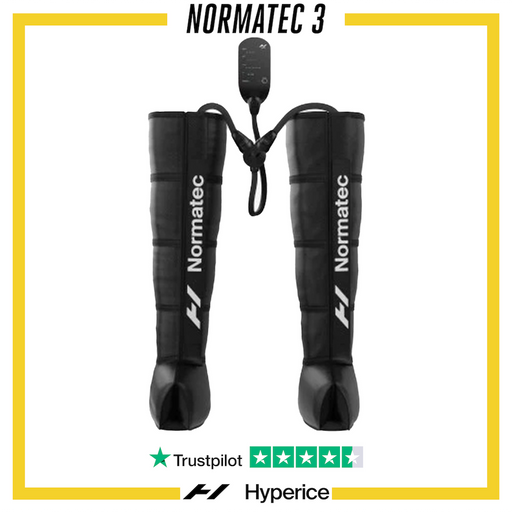
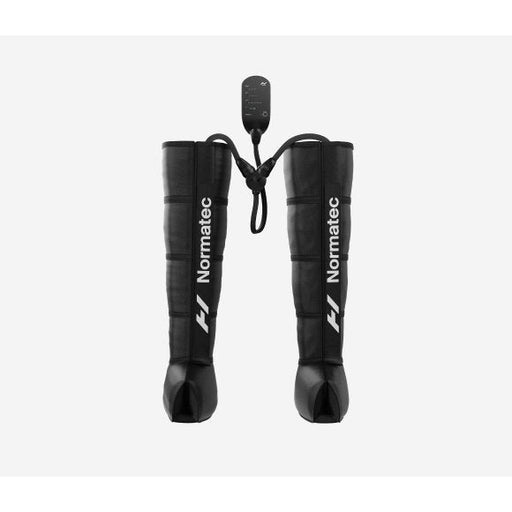
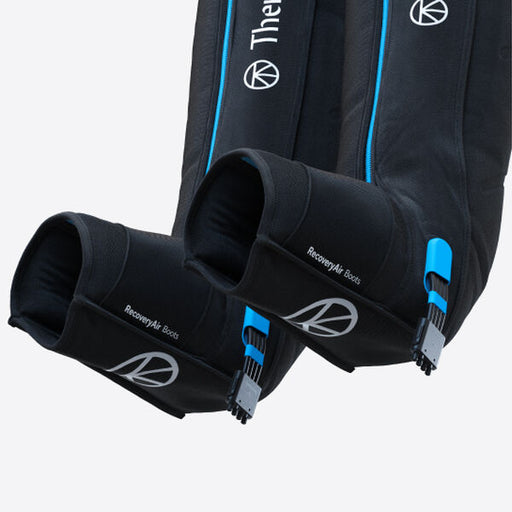
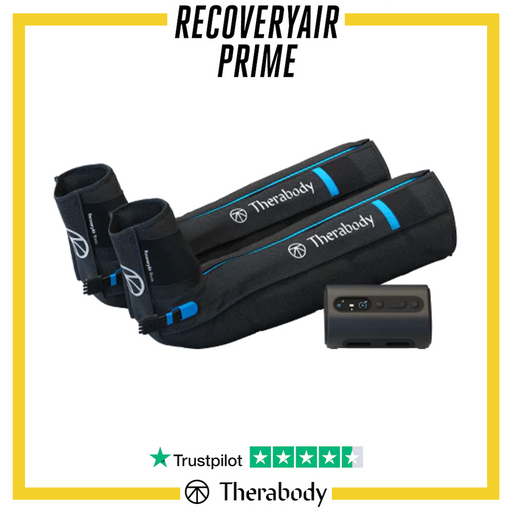
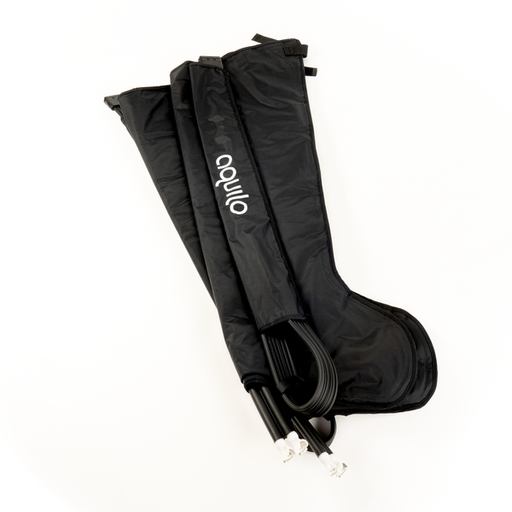
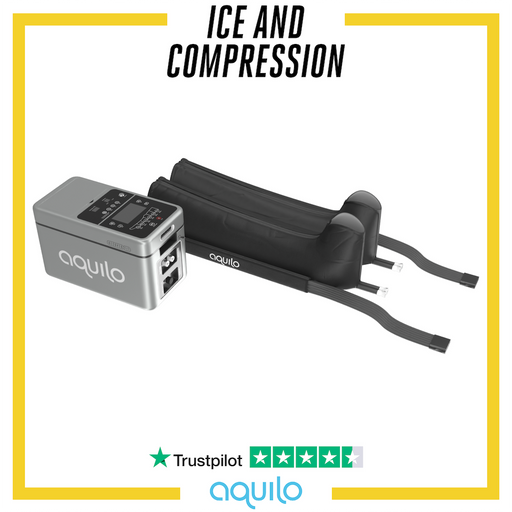
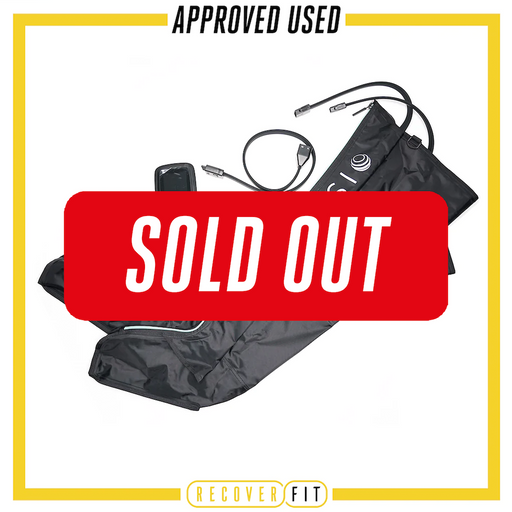


Comments
Leave a comment